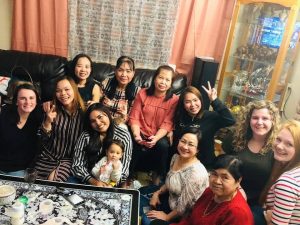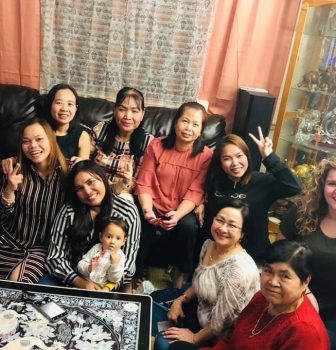By Madeline Mortell*
In the winter of 2017, I came home from to the United States after living in Cambodia for 18 months. During my time in Cambodia, I had just touched the surface of its rich culture and gained a deep love for the people. While I was home–and cold and hungry for Khmer food–I was eager to hang on to Cambodia. Soon after returning from Cambodia, I found a little Cambodian-owned donut shop in my hometown of Boise, Idaho. In true Khmer fashion, after one visit to the donut shop owner, I was welcomed to a Cambodian Christmas party the very next day.

My mom and I journeyed to the house across town and knocked on the door. We were overwhelmed with the kindness and generosity of the guests. All the guests, besides us, were of Cambodian heritage. Some guests had fled from the Khmer Rouge, others recently immigrated from Cambodia, and some were second-generation American citizens.
While the donut shop owner took me into the kitchen to sample some of the delicious food, my mom was left in the living room, surrounded by people she didn’t know and a language she couldn’t understand. Soon, a younger man started talking to my mom. His name was Prumvirak Nouhem and he began sharing his story of coming to America.
During the beginning of the Khmer Rouge period, Prumvirak lived at a labor camp. His dad was a lawyer, but let no one know, in fear of being executed. They were all starving with little access to food. One day he was sent to steal rice from the soldier’s stash to supplement the close-to-nothing rations the family had received. Upon stealing the rice, he saw a guard, dropped the rice bag, and ran back to his family. His mom sent him back again because the bag had the family’s name on it. If the soldiers found out who they were, the family would be killed. This was one of several moments when Prumvirak was close to being killed. Eventually, the family fled the camp, hid in the forest from soldiers, and escaped to Thailand.
Luckily, when Prumvirak was thirteen years old, his uncle lived in Seattle and arranged for his family to come to America. Because of his lack of schooling during the Khmer Rouge, Prumvirak was placed in the second grade. Now, he works at Micron in Boise, Idaho and has three beautiful children.
On the drive home from this Cambodian Christmas party, my mother began recounting Prumvirak’s story to me. Tears filled my mom’s eyes as she said, “I want to be a better person. That was one of the most amazing things I’ve ever heard.”
Stories, especially the resilient and jaw-dropping stories of the Cambodian people, change hearts. The Cambodian Oral History Project helps future generations not only find the genealogical information of their ancestors but tells the stories of the Cambodian people. These stories change hearts; they changed my mom’s heart, my heart, and literally, every other person’s heart who has heard the stories.
Ever since Christmas 2017, we look forward to the company of our Cambodian friends during the holiday season.
Madeline Mortell is a BYU student majoring in Public Relations and served previously as a missionary for the Church of Jesus Christ of Latter-day Saints in Cambodia. She is currently the project social media coordinator.

